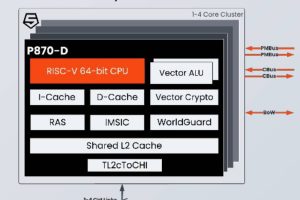 According to the company, the hardware-assisted verification and validation system can accelerate verification and validation cycles by up to a factor of 10.
According to the company, the hardware-assisted verification and validation system can accelerate verification and validation cycles by up to a factor of 10.
Building on the Veloce modular blade hardware introduced in 2021, Veloce CS system hardware has increased capacity with the ability to support design sizes from 40m gates, up to more than 40bn gates. System workloads are executed with up to five times improved emulation performance while maintaining full visibility, said the company. As well as accelerating the verification, it helps to decrease the cost per cycle.
The Veloce Strato CS for emulation is based on the CrystalX IC while the Veloce Primo CS (for enterprise prototyping) hardware run on the same operating system, for seamless transition between platform. The Veloce Primo CS is based on AMD’s Versal Premium VP1902 FPGA, claimed to be the industry’s most congruent enterprise prototyping system. Both blades are scalable from 40m gates to over 40bn gates. The company noted that this can dramatically accelerate ramp up, setup time, debug and workload execution.
The Veloce proFPGA CS is the smallest and widest blade of all three. It also uses the AMD Versal Premium VP1902 FPGA-based adaptive SoC, for software protoyping and is scalable from one FPGA to hundreds.
The modular blade configuration of all three Veloce CS hardware complies with modern data centre requirements for ease of installation, low power, cooling and a compact footprint. Siemens EDA adds that the eloce proFPGA CS additionally provides a desktop lab version.
This is the first time that three pieces of hardware have been introduced simultaneously, said Jean-Marie Brunet, VP and GM of hardware assisted verification at Siemens EDA. “This is a bold move and it all starts with the chip,” he said, describing the new 7nm process CrystalX as the heart of the emulator. “The hyperscale market has transformed to a highly scalable and highly interconnectable blade system,” he said, noting that the move from fixed chassis facilitates stacking and scaling. For the data centre, the increased capacity and performance bring benefits in terms of reduced weight density, less power for consumption and less needed for cooling and a multi-user compatibility to maximise investment with 24/7 operation.
Veloce CS is qualified to run with the latest AMD EPYC CPU-powered HP DL385g11 servers.
The Veloce Strato CS system is available now for selected partner customers. General availability of the three hardware platforms is planned for summer 2024. Customers have access to a portfolio of apps and solutions, common across all three Veloce CS system platforms.
The Veloce CS system is planned to be cloud-ready with general availability.
 Electronics Weekly Electronics Design & Components Tech News
Electronics Weekly Electronics Design & Components Tech News



